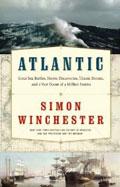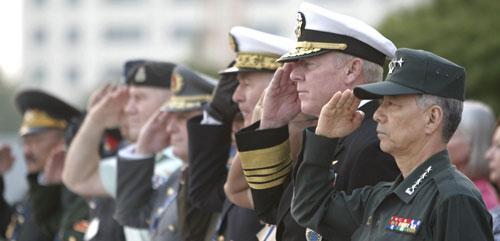Advertisement
Simon Winchester's Atlantic; Admiral Willard on the Pacific
Resume Four hundred thousand flights a year now zoom over the Atlantic. But the sea beneath was for eons the great barrier and bridge to humankind: Phoenicians, explorers, pirates, slave traders and sea captains. The great Simon Winchester brings the great Atlantic story back to light.
Four hundred thousand flights a year now zoom over the Atlantic. But the sea beneath was for eons the great barrier and bridge to humankind: Phoenicians, explorers, pirates, slave traders and sea captains. The great Simon Winchester brings the great Atlantic story back to light.Guest:
Simon Winchester, author of "Krakatoa," and the bestselling "The Professor and the Madman." His new book is "Atlantic: Great Sea Battles, Heroic Discoveries, Titanic Storms, and a Vast Ocean of a Million Stories." You can read an excerpt (PDF). It begins: "The ocean romance that lies at the heart of this book was primed for me by an unanticipated but unforgettable small incident. It was a clear cool dawn on Sunday, May 5, 1963, and I was eighteen years old..."
Closing Segment: We turn to the Pacific, where President Obama and Secretary of State Clinton rove this month. The admiral who heads the U.S. Pacific Command, Robert Willard, will sit down with us to talk 21st century security and trade, and the rise of China. Read a transcript of the conversation.

Guest:
Admiral Robert Willard, U.S. Navy admiral serving as commander of U.S. Pacific Command.
Listen to the interview below; excerpts from the transcript follow.
...
TOM ASHBROOK: ...[I]n terms of the Chinese naval and air presence in this same theater, what’s it look like compared to the U.S.?
ADMIRAL WILLARD: It’s expanded greatly in the last twenty years, and particularly in the last ten. They’re making very sizable investments, especially in their naval forces. And so they’re coming increasingly in contact with our ships and aircraft in the region, and it’s important that both sides continue to work together, military-to-military, and that the regional powers, as well, work with China as she emerges and grows her military — so that there are no misunderstandings, everyone is clear on intentions, and we’re all contributing constructively to the security of the region.
TOM ASHBROOK: How’s that going? I mean there have been moments – you know we had the famous incident over Hainan Island where the U.S. aircraft ended up in Chinese hands. We’ve had the Chinese get friendly with the U.S. and talk with the U.S. military. We’ve had them pull away some. Just recently, a number of retired Chinese and American generals sat down for talks, just in the last few days here – including your predecessor at the U.S. Pacific Command, Admiral Timothy Keating. What’s the quality of that conversation these days? The Chinese are asserting their own claims rather forcefully here. What about the communication between the two militaries?
ADMIRAL WILLARD: It’s been problematic. We’ve just recommenced military-to-military dialogue after a suspension that followed the last round of Taiwan arms sales a year or so ago.
TOM ASHBROOK: That is very large U.S. arms sales to Taiwan that got the Chinese pretty upset.
ADMIRAL WILLARD: Yes. And we’ve been responsible to provide arms and services to Taiwan for the last thirty years; so this is certainly nothing new. This particular reaction to the arms sales was extreme on China’s part, and military-to-military relations were suspended as a result. Secretary Gates has been very clear with regard to the importance of military-to-military relationships – not only the dialogue itself, but the continuum of the dialogue. And as I mentioned, we just recommenced discussions with the Chinese. We think it’s important that those discussions continue.
TOM ASHBROOK: The sort of most long-term, core issue here – Taiwan. And the U.S. backs Taiwan. China, of course, claims Taiwan as fully a part of China and never stops saying that it intends to have it reunited one day. The United States is on the other side of that. Everybody hopes for, again, a peaceful resolution of that. But there was in the Cold War when a lot of Americans were tuned-in to this question of Taiwan and Taiwan’s independence. These days it’s very little in the American conversation. You almost never hear Taiwan even mentioned. As Commander of the U.S. Pacific Command, do you think you’ve got the American people behind you in terms of, you know, supporting America’s commitments in this region?
ADMIRAL WILLARD: Well, our commitment to Taiwan is framed under the "One China" policy by the Taiwan Relations Act and three communiqués that were agreed to between the U.S. and China since we reestablished our relationships back in 1979.
TOM ASHBROOK: With mainland China?
ADMIRAL WILLARD: With mainland China, under now a "One China" policy. And where Taiwan is concerned, the United States intends that the future of Taiwan be determined by Taiwan and by mainland China and that that be determined peacefully. And so the Taiwan Relations Act establishes the importance that negotiations that might occur between Taiwan and mainland China occur in a peaceful way.
TOM ASHBROOK: Can China grow into its – I don’t know what you want to call it – its destiny? I mean it’s been growing like crazy, right? Can it grow into its destiny and share the Pacific peacefully with the United States? What’s that going to take?
ADMIRAL WILLARD: We hope so. I mean part of this is China – relatively new to the scene – understanding the purpose of –
TOM ASHBROOK: In modern terms –
ADMIRAL WILLARD: In modern terms – understanding the purpose of the United States military presence there, the security that we’ve provided that, frankly, China has prospered from for many decades. So this is about the two of us getting to know one another over time and understanding the benefits of sharing responsibilities in the region, and such that no single nation assumes responsibility or control over any part of the Asia Pacific. Which, again, contains many nations with economic and security interests in what goes on in these commons regions between us.
TOM ASHBROOK: President Obama has been in India. He’s now calling for India to have a seat on the Security Council. China, of course, has opposed that. There have been a lot of headlines about smaller countries in this region reaching out to the United States to stay very much involved as China’s power expands. Are you feeling it? Are you feeling China’s neighbors having a heightened interest in U.S. military presence in this region as China’s own power grows?
ADMIRAL WILLARD: Yes, but back to the point of India. India is a sizeable power in its own right – both economically, globally in terms of influence.
TOM ASHBROOK: Naval terms?
ADMIRAL WILLARD: And militarily, yes. They’re making their own investments and growing their military capacities in a sizeable way with great interest, obviously, in their regions – South Asia, the sea lines of communication between the Middle East and Asia proper. And India is the most influential nation in that region today. They have a common border with China, so there’s obviously an India-China dynamic that is ongoing and they have their own economic and other governmental relationships with the Chinese. So, China certainly gets the attention of all southeast Asian nations and South Asia nations, as well as Northeast Asia, and Oceania, and my region of the world, but President Obama is in India so that we can improve our relationships with India. It’s something that PACOM strives to do as well.
TOM ASHBROOK: Admiral Willard, nations field militaries on the back of economic strength. Economic strength rises, and they can have stronger militaries; [as it] falls, it’s harder to have a strong military. Do you have concerns about U.S. military strength in the Pacific as the relative economic strength compared to China changes?
ADMIRAL WILLARD: Today, no. The whole world is watching the consequence of the economic crisis that occurred, and the likelihood that there could be consequences in the future to our military budgets are something that every senior leader in the United States military obviously pays attention to, and I do too.
TOM ASHBROOK: Let me ask you, just finally, the incoming head of the Marines, the new Commandant of the Marines, General James Amos, has said he doesn’t want to see “don’t ask, don’t tell” changed. What about you?
ADMIRAL WILLARD: Well, the study that Secretary Gates directed, occur – I think reads out on the 1st of December — and like all military leaders, I’m anxious to see the results of that study. We’ve dealt with “don’t ask, don’t tell” over, you know, a good number of years now. It has served us well. That said, it’s a law, and were the “don’t ask, don’t tell” law to be repealed, we’ll endeavor to follow the law in the future as well.
TOM ASHBROOK: Will it work?
ADMIRAL WILLARD: I think so –
TOM ASHBROOK: Military terms?
ADMIRAL WILLARD: Yeah, I think so. You know, again, there are legal aspects to it, policy aspects to it, education and training aspects to it, and enforcement that would be required when we have any change in a large-scale legal mechanism like this.
-END-
This program aired on November 8, 2010.